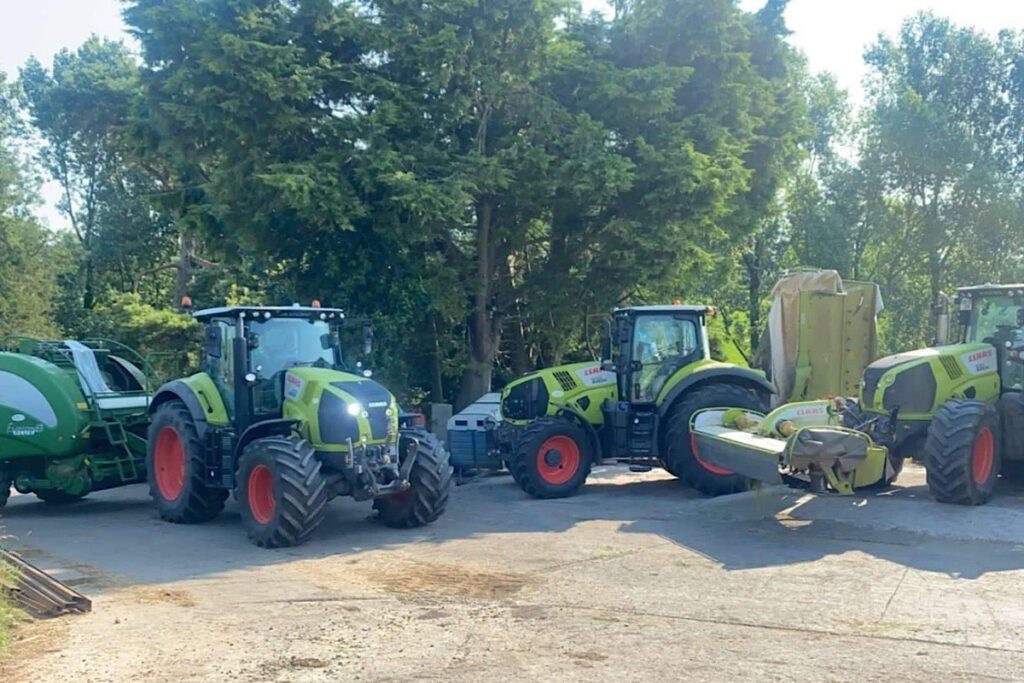As part of this week’s Agricultural Contractor of the Week segment, That’s Farming profiles Graeme Martin Contracts. He discusses establishing his agricultural contracting business, making up to 6,500 bales, challenges in the industry, building his own machinery company, and the future of Irish agricultural contracting.
“To be honest, I never worked with agricultural contractors until I started myself.”
Those are the words of Graeme Martin, who established his own firm eight years ago with a Renault 710rz Ares tractor, a Major 1,900-gallon slurry tanker and an Abbey AP900 spreader.
Following this, in year two, he established a silage wagon service, an umbilical slurry spreading service, and in year three invested in a second silage wagon to keep up with customer demand.
“I always had an interest in tractors and machinery. But, unfortunately, there was never much machinery at home,” Martin, a 2010 CAFRE graduate with an HND in agriculture, told That’s Farming.
Agriculture is a family tradition, with his father, Nigel, and brother, Ian, owning a farm with more than 100 pedigree Holstein dairy cows and circa 50,000 laying chickens.
They package and sell eggs from their poultry enterprise to shops and wholesalers.
Graeme Martin Contracts
Graeme Martin Contracts employs one full-time worker and two part-time operators, serving twenty miles of Monaghan town, building its customer base primarily through word of mouth and digital media.
“In my opinion, you have to look after your customers, and without looking after them, you would not have a business,” he explained.
“So, I believe you must complete your work to a good standard to ensure you get back to that customer.”
“I am working all spring focusing on slurry spreading, and then once summer comes, there will be a steady run of silage the whole way through and then muck spreading towards the backend of the year.”

Monaghan Agricultural Contractor
The company spends 300 hours of slurry spreading each year with the umbilical system.
It puts 1,200 acres of grass silage through its wagon, and four years ago, it added a baling service, which sees it make in the region of 6,500 bales annually, of which 250 are hay.
“Weather conditions have left it that slurry in the spring is piped, and we also have slurry tankers with umbilical pumps on the drawbar for ferrying slurry to the umbilical system.”
The Monaghan agricultural contractor revealed the business invested in wagons; firstly, to meet the farm’s feed requirements and secondly, because of a labour shortage in the agricultural contracting field.

Farm machinery
The business’s tractor fleet includes a CLAAS ARION 660, a CLAAS AXION 800 and a CLAAS AXION 810.
Other machinery includes a JCB 416 Wheel Loader, The McHale Fusion 3 Plus integrated baler wrapper, a CLAAS – mower, rake, and tedder, three PÖTTINGER silage wagons and a Rolland manure spreader.
Furthermore, the business also uses two Abbey 2750 Slurry Tankers and an Abbey 3500 Tandem Tanker, a BAUER SX1000 pump, 1,400m piping, dribble bars (his own), 800m back reeler (his own), 600m front reeler (his own) and a 300 CFM AH compressor.
“Leinster Farm Machines, Duleek, Meath, look after the tractors with silage wagons and other machinery maintained by ourselves or Kinkades Garage Agri Spares, Cootehill, Cavan, for any parts we need for the silage wagons.”
The firm aims to change at least one machine every year. “In my eyes, you must keep everything serviced and looked after on the tractors, especially for warranty.”
“Also, I feel it is a very competitive business with agricultural contractors coming in from Northern Ireland.”

Challenges
Like many other agricultural contractors, Graeme is no exception when it comes to rising prices of diesel, parts, and machinery.
“To be honest, it was almost taking me double the amount of money to fill a tractor full of diesel for a while.”
“In my view, machinery prices have jumped significantly. I do not have issues sourcing parts, but there is a long waiting time for new machinery.”
The Monaghan native feels “hard work” and “determination” are the critical elements of running a successful agricultural contracting business.
Martin Equipment
As a result of establishing Martin Equipment this year, a supplier of Low Emission Slurry Spreading (LESS) equipment for umbilical systems, Graeme has no expansion plans.
He exhibited at this year’s National Ploughing Championships, receiving orders from Ireland and overseas, which has proved successful for his business.
Graeme saw the advantages and disadvantages of different umbilical slurry systems and designed his own, with clients happy so far.
“I feel as an agricultural contractor, it leaves it while I build machines; I am fit to try equipment to see what changes I need to make before I start production.”
Commenting on the company’s product production levels through the year, he said:
“To be honest, production varies; for example, there would be a push-on with people looking for slurry equipment in spring which suits wet days when I cannot spread slurry.”
According to Graeme, sales slow down in the summer and increase around October, which suits his agricultural contracting work and leaves him with work all-year-round.
The future of Irish agricultural contracting
Looking to the future, he feels calendar farming will mean he must undertake more work in a shorter period to meet the earlier slurry ban window.
“When the farmer is struggling, the agricultural contractor is too. But unfortunately, all these new rules will make agricultural contracting more challenging.”
“I see agricultural contracting as a viable business, but I think they need to change machinery prices and running costs.”
“I believe agricultural contractor rates are not sufficient for what machinery and running costs have gone up, and they will have to go up if machinery prices and running costs do not come down,” the agricultural contractor concluded.
To share your story like this Monaghan agricultural contractor, email Catherina Cunnane, editor of That’s Farming – [email protected]





